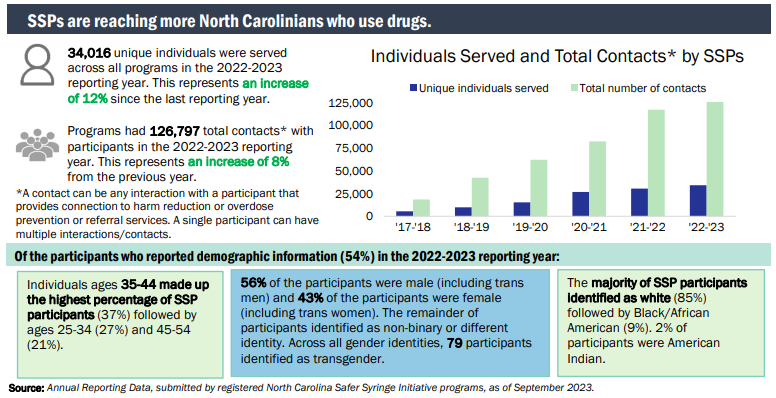
Overdose deaths in North Carolina have increased 84 percent since 2019
In a letter from Zack Moore, MD, MPH, and Kimberly McDonald, MD, MPH, NCMS Member, of the NC DHHS Division of Public Health, medical providers are being asked to to take action to protect and advance drug user health. The letter states that the number of overdose deaths in North Carolina (NC) has increased 84% since 2019. These overdose deaths are 100% preventable. Risks associated with illicit substance use can be mitigated through evidence-based strategies, including syringe services programs (SSPs). These programs play a vital role in public health, safety, and the provision of compassionate, person-centered care for people who use drugs and people with substance use disorders.
Trusted healthcare providers play a crucial role in supporting both the health of people who use drugs as well as the success of SSPs within our communities and healthcare systems.
Healthcare providers can take several actions to protect and advance drug user health:
- Identify the SSP(s) in your community. Contact these SSPs or visit their programs to learn about the services they provide.
- Make referrals to SSPs for patients who could benefit from their services.
- Collaborate with SSPs to learn more about current substance use trends they are seeing and hearing about from people who are directly impacted.
By learning about and working with SSPs, you can help ensure comprehensive care for individuals with substance use disorders, including referrals to addiction treatment, mental health services, and other healthcare needs. Your support and advocacy for these programs are essential in making our communities healthier and safer for everyone.
Healthcare providers can further support their local SSP by providing training or educational resources on topics like wound care practices, first aid and other health-related topics. It is also important that healthcare providers and other staff in the healthcare setting treat all members of the community with compassion and kindness. Many SSPs can provide training on person-centered, culturally relevant harm reduction topics.
Clinical studies and real-world implementation of SSPs show they are effective at reducing disease transmission and promoting safer use practices without increasing drug use. Endorsement of SSPs by leading health organizations, including the Centers for Disease Control and Prevention (CDC), the World Health Organization (WHO), and the American Medical Association (AMA) reflects the consensus among healthcare and public health organizations that SSPs are a critical component of comprehensive harm reduction strategies.
One of the things that makes the syringe service programs so effective is that many are led and staffed by people with lived experience. Many people who are living with substance use disorders struggle with stigma, shame, and isolation. SSP staff can utilize practical skills like motivational interviewing while sharing their own experiences to help others navigate these challenges. Their dedication has led to tangible improvements in the lives of countless individuals and families affected by substance use across the state.

SSPs can be the initial contact between healthcare providers and people who use drugs, fostering trust and engagement in ongoing care through a nonjudgmental environment. This linkage to care is a vital service provided by SSPs. In 2022-2023, SSPs in North Carolina made over 8,500 referrals for housing support, primary care, sexual and reproductive health services, wound care, dental services and other critical services. Twenty-four SSPs in North Carolina offered on-site testing services which resulted in 960 HIV tests and 1,000 hepatitis C tests. Programs that were not providing on-site testing made 5,505 referrals to HIV and hepatitis C testing and treatment providers. SSPs also provide options for safer disposal of used syringes and access to other injection supplies, thus helping to prevent spread of infectious diseases, which is far more cost effective than treatment. SSPs preserve public health and safety by reducing infections such as HIV, viral hepatitis, and endocarditis among people who inject drugs and by offering community health education, providing resources and information about infectious diseases as well as safer use practices.
SSPs are responsible for improving access to overdose prevention tools and education. Naloxone is the FDA approved medication to reverse overdoses and prevent death. SSPs put naloxone directly into the hands of people in the community who are at highest risk of experiencing or witnessing an overdose. SSPs have shown to provide low-barrier, free access to this life-saving medication which was reported to be used to reverse nearly 17,000 overdoses in North Carolina from 2022-2023. SSPs provide access to tools like fentanyl and xylazine tests strips which allow people to better understand what drugs they are using and empower them to make informed decisions about their health and wellness. These tools can aid in the prevention of overdose among people who may be opioid naive or may not want to use illicit fentanyl, xylazine or other substances.
Finally, providing access to sterile syringes and related health services is an ethical approach that respects the human rights of people who use drugs and ensures they receive the necessary care and support without facing stigma or judgment. Syringe services programs embody a compassionate and pragmatic approach to substance use, focusing on harm reduction and providing comprehensive support to help individuals achieve better health outcomes.
To learn more about North Carolina SSPs, visit the North Carolina Safer Syringe Initiative website at: https://www.ncdhhs.gov/divisions/public-health/north-carolina-safer-syringe-initiative
